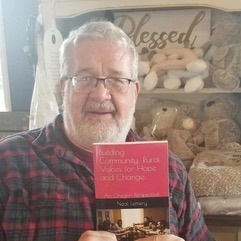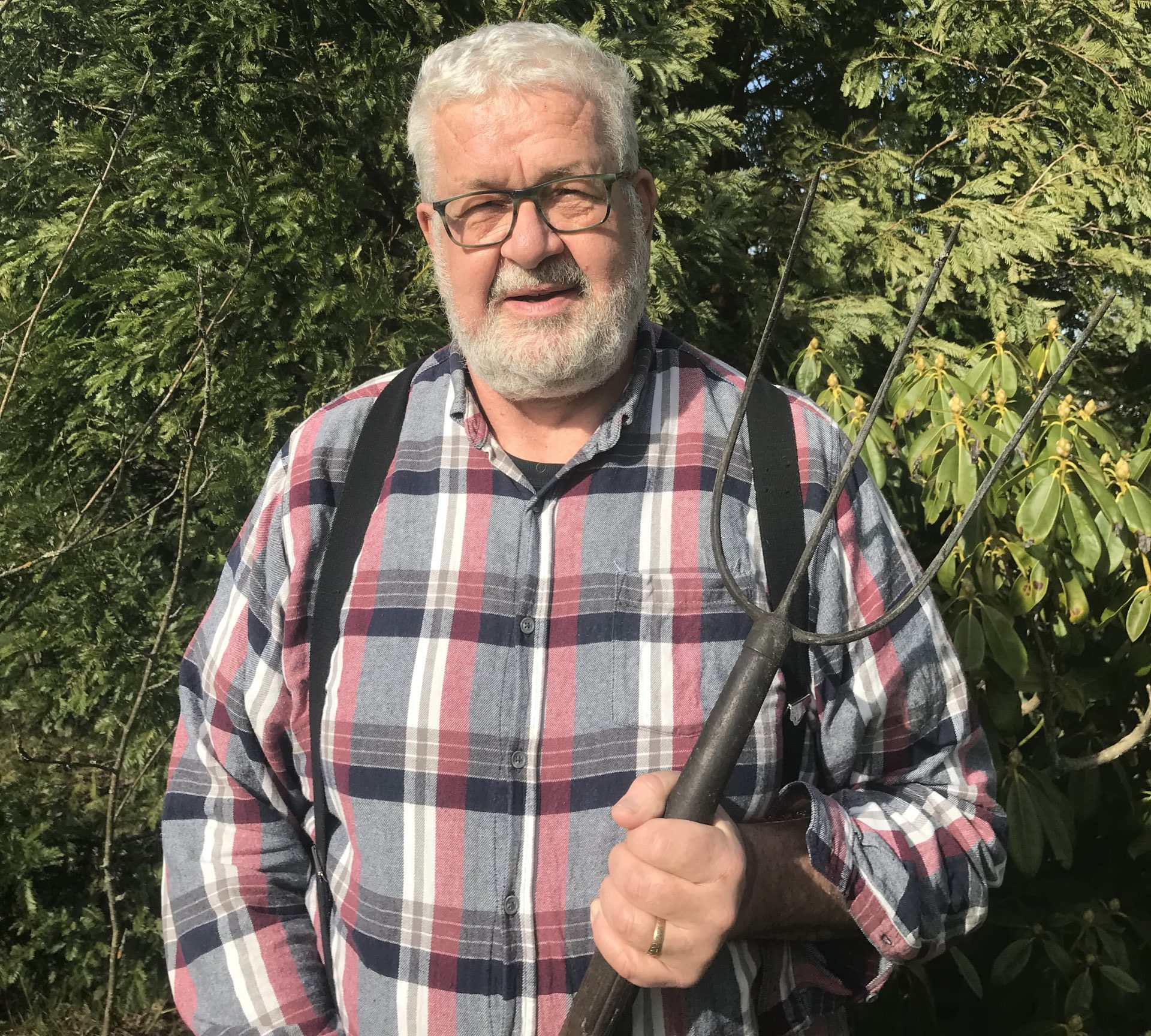By Neal Lemery
It was always in the barn, by the loose hay that Grandpa had tossed down from the hay mow, the bales breaking open, one by one, on the old wood floor. Grandpa forked the loose hay into each cow’s feeding trough. The hay dust smelled sweet, filled with the warmth of the summer days when we brought the hay up from the fields.
I knew there was a story about the hay fork, but the telling of that tale was a long time coming.
Back then, before milking parlors, each cow had its own stanchion, where they came in the mornings and the afternoons, getting their hay, a scoop of grain, and a small dollop of molasses. He took turns with the cows, putting on his two electric milking machines, with the milk then cooled by an elaborate milk cooler using water from the spring. The milk ended up in a number of steel milk cans, destined for the creamery a few miles down the road.
Grandpa made sure every cow had some hay, using the fork to move through the barn. He checked on every cow, calling them by name, rubbing their ears as he fed them the hay.
We loaded up the cans in the morning, after the milking, and a big breakfast back at the house, and headed off to the creamery. Grandpa didn’t talk much, but he held his own at the creamery, greeting all the other farmers, catching up on their news, talk about the weather and the price of milk. Everyone there were good friends, and there was no shortage of chatter and a few jokes.
The cows, the way that he milked and ran the farm, even the barn is gone now, after all these years. Not long after I headed off the college, they sold the farm and moved into town. Old age had crept up on him, and he wasn’t able to take care of his cows. The old ways of farming weren’t paying the bills anymore. A young man bought the farm, grateful for Grandpa’s advice and being able to take over managing the herd, changing the farm with the times.
Grandma and Grandpa moved into town, settling into a little apartment. We all helped them move, but the apartment only could hold a few items of furniture, including Grandma’s antique writing desk and glass-fronted case for all the family treasures. Grandma made sure that the desk was the first thing that was moved. All of Grandpa’s tools stayed behind.
On the last trip, Grandpa showed up at the pickup I was driving. The old hay fork was in his hands.
“I want you to have this,” he said. “Remember the farm, the good times we had, the cows.”
A tear rolled down his cheek, and I couldn’t find any words to say thanks. I gave him a big hug, and he got in the passenger seat. On the drive into town, we didn’t say much.
We normally didn’t. He wasn’t a man of words, and what can you say when a man is leaving his lifelong career, his whole way of life.
I asked him about the hay fork, how long he’d had it, how did he get it. He looked away, seeming to check out the farms along the way, looking at their cows, and the state of the pastures.
Finally, he started to tell me about a good friend of his, an old Swiss farmer. He had made the fork from the small forge and iron shop he had on his farm. He’d had a good piece of oak that he had pared down, to make the perfect handle, and the right snug fit of the handle of the iron, joining the oak to the iron, inserting a small rivet through the iron handle, into the wood. Everything about the fork was sturdy, functional, precise.
The farmer had given Grandpa the fork, refusing to take money for it, telling Grandpa it was a gift, a thank you for his friendship and advice over the years.
It was the perfect hay fork, just three tines, and somewhat small. Just the right size to grab the right amount of hay for each cow as they came into the barn for milking.
Once a year, Grandpa put a coating of linseed oil on the handle, letting it soak in. He’d oil the fork, too, making sure it wouldn’t get rusty. He always took good care of his tools, spending some time every week checking his equipment, making sure everything was in top condition.
It seemed he was always teaching me whenever I’d go to the farm for a visit, and a day or two of helping out. I’m not sure how much help I was, but he always had some chores for me. There was always a lesson. Good times, that old farmer and me.
He’d been in the war. It was the war three wars before the war that was going on when I was growing up. No one talked much about Grandpa’s war, especially Grandpa. I’d wondered about that, but no one in the family seemed to know.
He’d shown up after that war was over, looking for work, and Grandma’s dad hired him on to help out. He and Grandma fell in love, and they came to take over the farm after Great-granddad died.
I was the youngest grandson, so he and I had the farm all to ourselves when I showed up to visit. I was a curious sort, so one day I asked him about the war, and how he came to be here, so far from his childhood home, and his family’s farm. To my surprise, he started to talk, just one story that first time. But, as I kept showing up, he’d talk more, but only when we were alone, working in the barn, or out in the pasture, mending fence or driving the cows in for milking, or when we’d drive into town to deliver the milk.
The stories were sad, and brave, stories that never were told at school or in the history books I’d read. I thought he was a hero, one of the bravest men I knew, but he didn’t think so. It was just his life, just the way things were. Those times were in the past, happened a long time ago, and no one would be interested in them.
I’d wondered why he was always so nice to the neighbors, and the young farmers just getting started, sometimes lending them a tool, or taking his tractor over to their place, and working their land for a day; all without getting paid. He’d get upset if someone offered to pay him for the work, or the use of a tool, or his tractor. He’d just respond that he was a neighbor, and that’s what neighbors do.
I didn’t write down his stories, and I didn’t share them with the rest of the family. I knew Grandpa was a private, humble person, who didn’t want to brag, or even let on what he’d experienced, and what he knew about people, and wars, and the evils of being selfish and prideful.
I still have that fork. It stands in a place of honor with my other garden tools. I’m not a farmer, and I don’t have any hay to feed to any cows, but I still use my fork. I have enough land to care for that I have a burn pile, brush and prunings that pile up that need to get burned once in a while. I bring out my fork, and use it to stack the brush and rearrange all the debris once the fire gets started.
Grandpa did that too, using the fork on his burn piles, putting things in order, taking care, keeping his farm neat and tidy.
Every year, I still find a rag and some linseed oil, and take care of my tools, making sure Grandpa’s fork is first in line. I feel him next to me at those times, looking after me, checking my work, ready to offer me a hand on my shoulder, or a laugh at a shared joke. His gentle, neighborly ways seem part of my life now, lessons taught well and learned deeply. His gifts go deep with me, far-reaching, lifelong. This week, I started a fire on my burn pile. I picked up his fork, tending my fire, taking care of the land, being the grandson. I remembered him and all that he taught me about kindness, neighbors, and life. I’ve tried to carry all that on, to the next generation, to teach others what Grandpa taught me on his farm.

Books: NEW book – Building Community: Rural Voices for Hope and Change; Finding My Muse on Main Street, Homegrown Tomatoes, and Mentoring Boys to Men


.png)